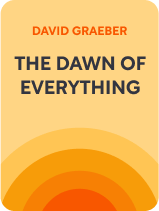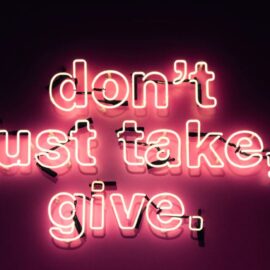

This article is an excerpt from the Shortform book guide to "The Dawn of Everything" by David Graeber. Shortform has the world's best summaries and analyses of books you should be reading.
Like this article? Sign up for a free trial here.
Why does inequality exist, and when did it start? Is inequality a necessary evil of any large, complex society?
David Graeber and David Wengrow attempted to answer these questions by looking at historical and anthropological research. They found that our beliefs about the evolution of societies have been wrong. They discuss their findings in the book The Dawn of Everything: A New History of Humanity.
Keep reading for an overview of this thought-provoking book.
Overview of The Dawn of Everything: A New History of Humanity
Throughout humanity’s long history, cultures have always been much more diverse than we tend to believe, and the presumed evolution of societies from “primitive” to “civilized” is a myth. Armed with this new worldview, the authors of The Dawn of Everything: A New History of Humanity challenge us to use our imaginations to envision new possibilities for our world today.
David Graeber was an American anthropologist and professor at the London School of Economics. He was an anarchist and political activist and is credited with being a driving force of the Occupy Wall Street movement. After a decade-long collaboration, Graeber had just finished working on this book with David Wengrow weeks before he passed away unexpectedly in 2020. The book was published posthumously.
David Wengrow is a British archaeologist and professor at the University College London. He has done archaeological research in Africa and the Middle East, and he focuses on questions of human evolution and the origins of civilizations. This book was the result of a decade-long correspondence, collaboration, and friendship between Graeber and Wengrow.
We’ve organized this overview into four major parts:
- In Part 1 we’ll discuss what’s known as the “indigenous critique” of European culture and show how that led to the “enlightened” thinking that revolutionized European philosophy.
- In Part 2, we’ll explore how indigenous notions of freedom and equality contributed to a simplified anthropological narrative about the evolution of human societies.
- In Part 3, we’ll examine Graeber and Wengrow’s critique of that conventional narrative.
- In Part 4, we’ll delve into the authors’ thought-provoking questions about the inevitability of inequality and the potential for dismantling and reorganizing our own social systems.
Part 1: The Indigenous Critique
Graeber and Wengrow’s examination of diverse social structures, values, and beliefs begins with a discussion of the relationship between the indigenous tribes and European colonists in North America. These interactions informed the European view of indigenous societies in general and ultimately came to influence European culture itself. This is because, the authors argue, European Enlightenment philosophy was inspired by the native North American people’s critique of European customs.
Graeber and Wengrow explain that the native North Americans had strong philosophical traditions and skilled orators who challenged European colonial officials in debates. In particular, French Jesuits in the area around Montreal (known then as New France) had a series of lively intellectual and philosophical discussions with Kandiaronk, a leader of the Wendat people.
Kandiaronk raised scathing critiques of European social customs and values, particularly criticizing monarchical rule, social hierarchies, emphasis on the accumulation of wealth and materialism, and punitive justice systems. These descriptions then made their way back to Europe, where they were widely distributed among the intellectual class and, Graeber and Wengrow argue, became the inspiration for much Enlightenment thought.
Notions of Freedom and Equality
Graeber and Wengrow say that Europe before the 1700s lacked a notion of social equality. By contrast, many of the Native American cultures had no notion that anyone could be born higher or lower in status than anyone else or that anyone could have authority over anyone else. In such cultures, status might be gained with age or according to merit.
According to Graeber and Wengrow, people in societies that we would call egalitarian (meaning everyone is equal) actually seem to be less concerned with equality than they are with autonomy, meaning an individual’s right to self-govern.
Graeber and Wengrow identify three forms of freedom that are commonly at the foundation of an egalitarian cultural value system: the freedom to move away, the freedom to disobey, and the freedom to build new social worlds.
The authors ask us to consider how these notions of freedom align with our worldview in modern society. We tend to have paradoxical ideas about freedom, wherein we all want our personal freedoms but we believe authority, embedded in the government, is absolutely necessary.
Enlightenment Values
Graeber and Wengrow point out that the values of contemporary American and European cultures are more aligned with the values of indigenous Americans in the 1700s than with European culture from that time. They argue that this is because the “indigenous critique” by Kandiaronk and others like him had a profound influence on European Enlightenment thought.
The authors argue that indigenous ideas about reason, individual liberty, and equality clearly had an impact on the thinking of Enlightenment philosophers.
Part 2: The Conventional Anthropological Narrative
Graeber and Wengrow explain that, since Enlightenment thinkers were particularly fascinated with the indigenous people who had egalitarian ideologies, those descriptions received the most attention in Europe. Over time, Europeans came to view all indigenous peoples as living in societies where everyone was equal and there was no formal leadership. Likewise, when they looked at their own societies and others like them, which were arranged in monarchies, they believed that all modern societies were hierarchical. This was a gross oversimplification.
The Evolution of Human Societies
anthropological scholars theorized that human societies evolve over time from simple egalitarian bands and tribes to complex stratified states. According to Graeber and Wengrow, scholarly discussions of equality and inequality tend to assume that inequality is a result of the rise of agriculture. One of the major points the authors argue in this book is that this conventional narrative is wrong.
According to Graeber and Wengrow, anthropologists traditionally describe the evolution of human societies as follows:
- Bands were small groups of hunter/gatherers.
- Tribes were larger groups with a leader and a more complex organization around distinctions in rank and status.
- Chiefdoms were somewhat larger and more complex than a tribe, often with social status being tied to how closely one is related to the chief’s family. Inequalities in rank and status didn’t translate into haves and have-not, so these are also considered relatively egalitarian societies.
- States are a much larger and more complex social organization with a centralized government, emerging with large-scale agriculture. They are ranked hierarchically, based on relative access to resources such as ownership of land and monetary wealth. The agricultural state is associated with the origin of private property, hierarchy, and patriarchy.
The authors say the dominant narrative in this framework is that the adoption of agriculture dramatically changed the way humans lived and that it led to formal social and economic inequality. They point out that it’s still commonly accepted that the forms of society that existed before agricultural states were all somewhat similar—small, simple, and relatively egalitarian. We can also see in this framework what Graeber and Wengrow challenge in this book: the idea that inequality is an inevitable fact of life in a state-level society.
Part 3: Challenging the Conventional Narrative
Graeber and Wengrow argue that the truth is much more complex than our traditional narrative suggests. They say that, when you look at the historical evidence without an evolutionist bias, you find that people in all times and places have been conscious political actors making deliberate decisions about how to live and that they’ve chosen the kinds of social and political organizations that suit them best.
Debunking the Myth of the Egalitarian Tribe
Graeber and Wengrow argue that hierarchy and equality have existed in a variety of ways alongside one another throughout all of recorded history. The whole idea that societies have evolved—from bands to tribes to chiefdoms to states—suggests that all human societies are in whatever stage of development they’re in just because they haven’t yet reached the next stage of development. But Graeber and Wengrow say there are two major problems with this assumption:
First, many non-agricultural societies had a combination of features of those different structures. Some would be impossible to fit into one of the four evolutionary categories. Second, there are records of some indigenous cultures choosing to change their social organizations, either temporarily or permanently.
Undermining the Indigenous Critique
Graeber and Wengrow argue that this oversimplified view of indigenous societies was deliberately used to undermine the indigenous critique of European culture by equating “egalitarian” with “primitive.”
Debunking the Myth of the Agricultural Revolution
The authors point out that there’s evidence that people were cultivating crops since at least 10,000 BC, while major state-level societies didn’t happen until long after that. Also, they say, some societies have farmed and never become hierarchical states.
Additionally, Graeber and Wengrow point out that there were non-agricultural societies that had the concept of private property and there have been many farming societies that understood all land as communally owned. So, the authors suggest that farming allows for the possibility of a hierarchical state to emerge, and it is conducive to notions of private property, but it doesn’t make these things inevitable, nor does it cause them to happen.
Part 4: Is Inequality Inevitable?
The driving question of this project is this: How did we come to view inequality as inevitable and get stuck in unequal state-level societies? Rather than answering this question, the authors simply raise it for the reader’s consideration, suggesting that understanding the complexity and diversity of different kinds of societies throughout history might prompt us to broaden our ideas about the possibilities for our contemporary societies.
A thorough examination of the literature shows us that people throughout history have deliberately changed social and political customs that weren’t working, and they were able to creatively envision different alternatives. Could we use these examples as templates to imagine alternatives for ourselves?
Graeber and Wengrow leave us with more questions than answers. But, in conclusion, they point out that earlier people took conscious steps to avoid domination and hierarchy and to protect personal freedoms, liberties, and equality. And they say this indicates that we could also dismantle the systems we have in place and build something different. We’re only limited by our imaginations.

———End of Preview———
Like what you just read? Read the rest of the world's best book summary and analysis of David Graeber's "The Dawn of Everything" at Shortform.
Here's what you'll find in our full The Dawn of Everything summary:
- How our beliefs about the evolution of human societies have been wrong all along
- An exploration of different notions of freedom and equality
- Thought-provoking questions about the inevitability of inequality






